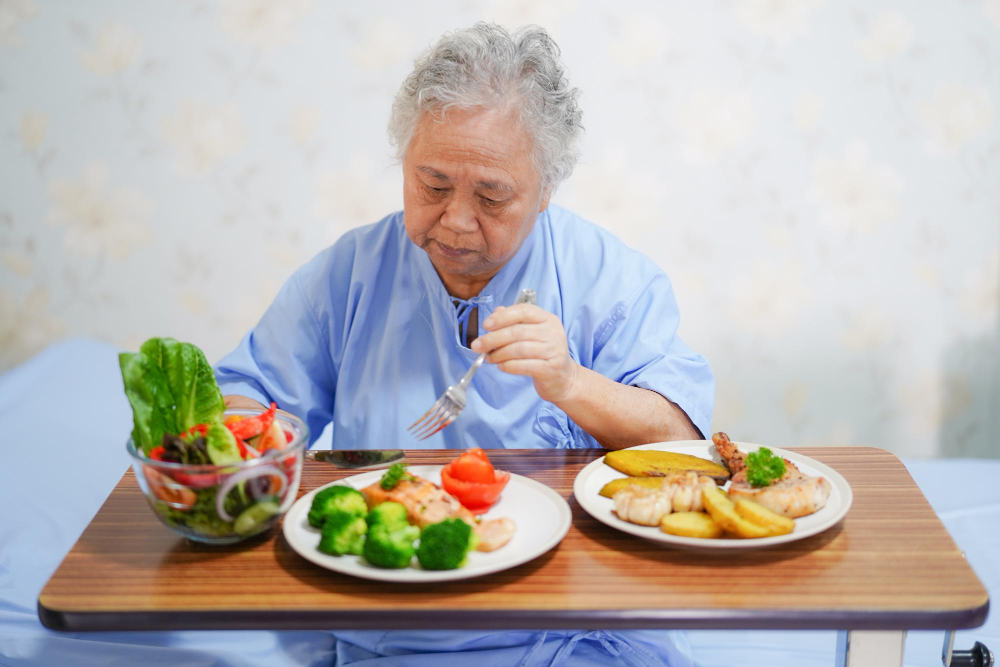Understanding the Basics of Nutrition and Wound Care
Nutrition and wound care can be a overwhelming process to understand. Wound healing is a complex process requiring multiple biological and molecular events. These include cell migration, proliferation, and collagen synthesis. Each event plays a crucial role in the wound healing process and impacts recovery outcomes.
Nutrition significantly influences the molecular effects involved in healing wounds. A well-balanced diet for adults accelerates the process, while poor nutrition delays recovery. Adequate nutrition supports collagen synthesis, ensuring stronger and more effective tissue repair during wound healing.
For chronic wound patients, addressing risk factors like poor nutrition is essential. Patients at risk of complications benefit greatly from tailored dietary plans. Proper nutrition reduces the impact on wound healing and minimizes recovery time.
The human body relies on specific nutrients to repair tissues and fight infections during recovery. These nutrients play a significant role in improving outcomes for chronic wound patients. Addressing these needs through a strategic diet for adults enhances the healing process.
In this article, we explore the intricate relationship between nutrition and the wound healing process. You will learn how nutrients aid in healing wounds and discover the best practices for supporting recovery. VitaVia Medical offers expert wound care treatment in Houston, Texas, with a focus on nutrition’s role in recovery.
The Importance of Nutrition in Wound Healing
Wounds heal faster when you consume adequate amounts of the right foods. Proper nutritional intake provides essential energy and nutrients. These nutrients support the wound healing process by repairing tissues and maintaining your overall health. During healing, your body requires extra energy, which comes from calories in your diet.
Nutritional deficiencies can lead to delayed wound healing and increase the risk of infection. Current evidence shows that proper nutrition offers protective effects against complications during recovery. It also enhances immune responses, promoting effective wound healing and reducing the likelihood of infections.
Your activity level and nutritional requirements change during the wound healing process. Meeting these needs ensures that your body can repair tissues efficiently. Foods with anti-inflammatory effects are especially helpful in skin wound healing by reducing swelling and promoting tissue regeneration.
Proper nutrition has beneficial effects on overall health and accelerates recovery times. When your body receives adequate nutrients, it has the energy and resources to focus on healing. The effects on wound healing are significant, as a strong nutritional status improves outcomes and minimizes complications.
Understanding the connection between diet and the wound healing process empowers you to make better food choices. By addressing your nutritional status, you can experience faster healing and a reduced risk of infection.
Key Nutrients for Wound Healing
1. Protein
Protein is crucial for tissue repair and plays a significant role in optimum wound healing. It helps rebuild muscle and skin while supporting immune function. During the inflammatory phase of healing, your body requires protein for energy and recovery.
Including high-quality protein foods in your diet provides beneficial effects on tissue regeneration and overall health. Lean meats, fish, dairy, legumes, and nuts are excellent sources of protein. Meeting your nutritional requirements ensures your body has the resources to repair damaged tissues effectively.
Protein energy malnutrition can delay healing and lead to complications like loss of lean body mass. Consuming adequate protein strengthens the immune system and enhances recovery during the inflammatory phase. Experts recommend 1.2 to 2.0 grams of protein per kilogram of body weight daily.
By prioritizing protein-rich meals, you can experience faster healing and reduced complications. The beneficial effects of proper protein intake extend beyond healing, improving your overall health. Balancing your nutritional requirements is essential for long-term recovery and maintaining lean body mass.
4o
2. Vitamins
Vitamins play a significant role in the promotion of wound healing by supporting immune function and aiding cell growth. Key nutrients like Vitamin C, Vitamin A, and Vitamin E are essential for the repair of body tissue.
Vitamin C: This nutrient is vital for collagen synthesis, which strengthens and maintains wound integrity. Citrus fruits, strawberries, and bell peppers are excellent sources of Vitamin C. Vitamin C supplementation can also enhance healing, especially in patients at risk of nutrient deficiencies or malnourished patients.
Vitamin A: This fat-soluble vitamin promotes epithelialization and skin repair. The benefits of Vitamin A are evident in foods like sweet potatoes, carrots, and dark leafy greens. These foods provide essential nutrients for effective recovery.
Vitamin E: Known for its antioxidant properties, Vitamin E helps protect tissues from oxidative stress. Nuts, seeds, and green leafy vegetables are rich in this essential vitamin. These fat-soluble vitamins offer additional protection during the healing process.
3. Minerals
Minerals are critical for molecular effects related to wound healing. Zinc and iron are two key nutrients essential for optimal recovery.
Zinc: It plays a crucial role in immune function and collagen synthesis. Sources of zinc include meat, shellfish, legumes, and seeds. These are especially important for patients at risk of nutrient deficiencies.
Iron: It facilitates oxygen transport to cells, which supports the repair of body tissue. Sources of iron include red meat, beans, and fortified cereals. These foods are particularly beneficial for patients with delayed healing due to poor nutritional status.
4. Omega-3 Fatty Acids
Omega-3 fatty acids reduce inflammation, promoting a balanced healing environment. Fatty fish, flaxseeds, and walnuts are excellent sources of these essential nutrients. They provide anti-inflammatory properties crucial for wound recovery.
5. Hydration
Adequate fluid intake is vital for overall health and the promotion of wound healing. Water helps transport essential nutrients and remove waste efficiently. Staying hydrated also maintains skin elasticity, aiding the repair process. Aim for at least 8 cups of water daily, or more if your activity level increases.
Addressing Nutritional Factors in Special Diets
A vegan diet can meet nutritional requirements for wound healing when carefully planned. Plant-based sources of Vitamin C, such as strawberries and bell peppers, are excellent for collagen synthesis. Sources of zinc, like legumes and seeds, support immune function and healing. Addressing potential vitamin D deficiency is critical, as evidence of Vitamin D’s role in tissue repair shows its importance. Nutritional supplementation may be necessary for patients at risk of malnutrition or those with specific dietary restrictions.
Meeting nutritional needs is essential to avoid the effects of malnutrition and support effective healing. Incorporating key nutrients, fluid intake, and balanced vitamins and minerals ensures faster recovery and overall well-being.
The Role of Macronutrients in Wound Healing
Macronutrients are the building blocks of our diet. They include carbohydrates, proteins, and fats. Each macronutrient plays a role in wound healing.
Carbohydrates
Carbohydrates provide the energy needed for healing. They support cellular functions and immune response. Choose whole grains, fruits, and vegetables for sustained energy. Avoid simple sugars that may lead to energy crashes.
Fats
Healthy fats are essential for cell structure and function. They also provide energy. Include sources of healthy fats like avocados, nuts, and olive oil in your diet.
The Impact of Nutrition on Aesthetic Outcomes
The relationship between nutrition and wound healing extends to aesthetic outcomes as well. Proper nutrition can improve the appearance of scars and skin post-healing. Nutrients that support skin health include vitamins C and E, zinc, and omega-3 fatty acids.
Consuming a balanced diet improves overall skin tone and texture. A healthy diet can reduce the risk of scarring and other skin complications.
Preoperative Nutritional Status and Surgical Outcomes
Before surgery, it is essential to optimize nutritional status. Proper preoperative nutrition can lead to better surgical outcomes. It reduces the risk of postoperative complications. Ensure you have adequate protein, vitamins, and minerals before undergoing surgery.
Nutritional Strategies for Wound Care
Dietary Assessment
Assess your current diet to identify nutrient gaps. This assessment can help tailor a specific plan that meets your healing needs.
Meal Planning
Plan balanced meals that are rich in vitamins, minerals, and proteins. Incorporate a variety of colorful fruits and vegetables. This diversity ensures you receive essential nutrients.
Supplements
In some cases, supplements may be necessary. Consult with a healthcare provider to determine if they are appropriate for you. Supplements can help fill nutritional gaps.
Nutritional Challenges in Wound Care
Many factors can hinder proper nutrition. These include age, chronic illness, and socioeconomic status. Malnutrition can delay wound healing and increase complications. Addressing these challenges is vital for effective wound care.
Addressing Malnutrition
If you experience malnutrition, seek help. Nutritionists and healthcare providers can create customized plans. These plans can improve your nutritional status and support healing.
How VitaVia Medical Can Help
VitaVia Medical specializes in wound care treatment in Houston, Texas. Our team understands the importance of nutrition in the healing process. We provide personalized care plans that incorporate dietary recommendations. Our goal is to accelerate your recovery and improve healing outcomes.
Comprehensive Wound Care
At VitaVia Medical, we take a comprehensive approach to support the wound healing process. We assess your nutritional needs and develop customized plans for effective wound healing. Our experts understand the crucial role nutrition plays in addressing chronic wounds and improving recovery times.
We guide you on the best dietary choices to enhance the beneficial effects of nutrition on healing. Our team educates patients about various aspects of wound healing, ensuring you stay informed and confident in your care. By focusing on the role of nutrition, we promote faster recovery and long-term health improvements.
Nutrition provides essential support to every stage of the wound healing process. It strengthens your body’s ability to repair tissue and prevents complications. For those managing chronic wounds, our tailored nutritional plans offer a pathway to better outcomes. We highlight the beneficial effects of proper nutrition to ensure wounds heal efficiently and thoroughly.
At VitaVia Medical, we empower you with the knowledge and resources to take control of your healing journey. With the right guidance, you can experience the transformative benefits of a holistic approach to wound care.Support and Guidance
We offer ongoing support throughout your healing journey. Our healthcare professionals are available to answer your questions. We help you navigate the complexities of nutrition and wound care.
Community Resources
We believe in empowering our community. VitaVia Medical provides resources and workshops on nutrition and wound care. These resources help educate individuals on the importance of proper nutrition in healing.
Final Thoughts on Nutrition and Wound Care
Nutrition plays a crucial role in wound healing by supporting every phase of wound healing. Adequate intake of macronutrients and micronutrients strengthens tissues and accelerates recovery. Proper hydration also enhances the molecular effects that improve wound strength and overall healing outcomes.
At VitaVia Medical in Houston, Texas, we understand the importance of nutrition during all stages of wound healing. Our personalized approaches to wound management address specific needs, ensuring your body gets the right support. Our healthcare providers offer expert nutrient advice to reduce the risk of complications and promote faster recovery.
By focusing on nutrition, you can take proactive steps to strengthen tissues and optimize every phase of wound healing. Partnering with a trusted healthcare provider ensures you receive the care needed for long-term healing success.
If you or a loved one is managing wounds, contact VitaVia Medical today. Our tailored approaches from wound management will guide you toward effective recovery. Together, we can help you achieve optimal wound strength and improved quality of life.








